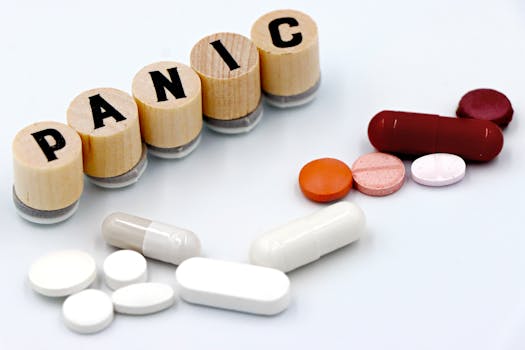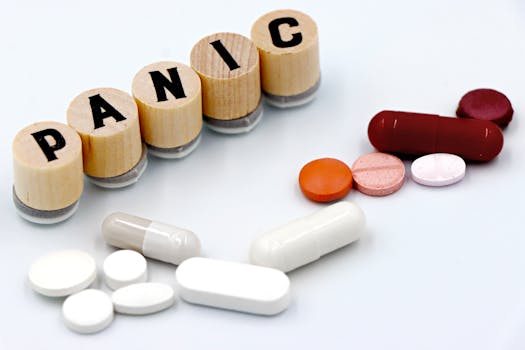People experiencing panic attacks often search for effective ways to manage their symptoms. One option commonly considered is panic attack pills, which can help alleviate the intense feelings of fear and anxiety associated with panic disorders. In this article, we’ll explore different medication options, how they work, and considerations for those thinking about prescription medications.
Understanding Panic Attack Pills
Panic attack pills are medications prescribed to manage the symptoms of panic disorders and anxiety. These medications function in various ways to help reduce the frequency and severity of panic attacks. Clinicians may prescribe them as part of a broader treatment plan, which could include therapy and lifestyle changes.
Types of Medications for Panic Attacks
Several classes of medications are used to treat panic disorders and related anxiety symptoms. Each type has unique characteristics, benefits, and potential side effects:
- Benzodiazepines: Often prescribed for short-term use, these medications are known for their fast-acting relief of panic symptoms. They work by calming the central nervous system but can lead to dependency if used long-term.
- Selective Serotonin Reuptake Inhibitors (SSRIs): Considered one of the best medications for panic attacks and anxiety, SSRIs are often used as a long-term treatment option. They help increase serotonin levels in the brain, which can improve mood and reduce anxiety.
- Serotonin-Norepinephrine Reuptake Inhibitors (SNRIs): Similar to SSRIs, SNRIs affect both serotonin and norepinephrine levels in the brain and are used to treat anxiety and panic disorders.
- Tricyclic Antidepressants: An older class of medications, these are sometimes used when SSRIs and SNRIs are not effective. They also modify serotonin and norepinephrine levels but can have more side effects.
Factors in Choosing the Best Medication for Panic Attacks
Determining the best medication for panic attacks is a personalized process. Factors that influence this decision include:
- Severity of Symptoms: Medications are typically considered if symptoms significantly impact daily life.
- Medical History: A clinician will take into account other health conditions and medications being used to avoid interactions.
- Response to Previous Treatments: Past experiences with medications can guide future selections.
- Potential Side Effects: Understanding the side effects can help in choosing a suitable medication.
It’s essential to work closely with a healthcare professional when considering panic attack pills. They will help evaluate the risks and benefits of different medications in context with your unique health needs.
The Role of Panic Attack Pills in Drug Treatment for Panic Disorder
Panic disorder medications are often part of a comprehensive treatment strategy. By addressing the chemical imbalances that contribute to panic attacks, these pills can help stabilize mood and reduce anxiety over time. They are pivotal in managing long-term symptoms and can considerably improve quality of life when combined with therapy and lifestyle adjustments.
For more insights into alternatives and a broader discussion on anxiety management, explore alternative treatments for anxiety here.
Considerations for Fast Acting Medication for Panic Attacks
For individuals seeking immediate relief, fast-acting medications like benzodiazepines may be recommended. While they offer quick symptom relief, it’s important to be aware of potential dependency risks and to use them strictly as prescribed.
Medications to Treat Panic Disorder: A Long-Term Solution?
While medications can be effective, they often work best as part of a holistic treatment plan. Combining medication with cognitive behavioral therapy (CBT) or other therapeutic approaches can optimize outcomes and support recovery. Collaborating with a mental health professional is crucial for developing a suitable long-term plan.
For reliable information about panic disorders, consider checking authoritative sources like this one.
Exploring Alternatives
While panic attack pills provide significant benefits for many, exploring alternative methods can be valuable. Lifestyle changes, regular exercise, mindfulness practices, and nutritional adjustments are non-pharmaceutical approaches that complement drug treatments.
For those seeking non-prescription options, our guide on over-the-counter alternatives offers useful insights.
When considering panic attack pills, understanding all available options helps make an informed choice toward managing panic attacks effectively.
- Panic attack pills can be crucial in managing panic disorder symptoms when used in a comprehensive treatment plan.
- Various medications, such as SSRIs, SNRIs, and benzodiazepines, offer different benefits and risks.
- Consulting with healthcare professionals is vital for safe and effective treatment.
- Combination therapy, involving both medication and techniques like CBT, can enhance treatment efficacy.
- Understanding the potential side effects and lifestyle modifications is essential for comprehensive care.
FAQ
What are panic attack pills?
Panic attack pills refer to medications prescribed to manage the symptoms of panic disorders, typically focusing on reducing anxiety and preventing future panic attacks.
What is the best medication for panic attacks and anxiety?
The best medication varies by individual and often includes SSRIs or SNRIs. Consulting with a healthcare provider is necessary to determine an appropriate option.
Are there fast-acting medications for panic attacks?
Yes, benzodiazepines are known for their quick relief of panic attack symptoms. However, they are generally prescribed for short-term use due to the risk of dependency.
How are panic attack disorder medications prescribed?
A healthcare professional prescribes these medications based on medical history, symptoms severity, and overall health conditions, tailoring treatment to individual needs.
What are the side effects of panic drugs?
Side effects can vary based on the medication, but may include dizziness, sleep disturbances, and potential dependency. It is essential to discuss potential side effects with a healthcare provider.






